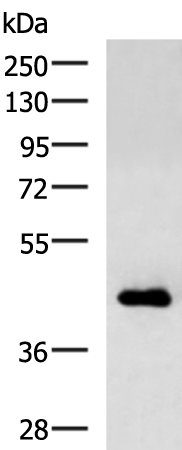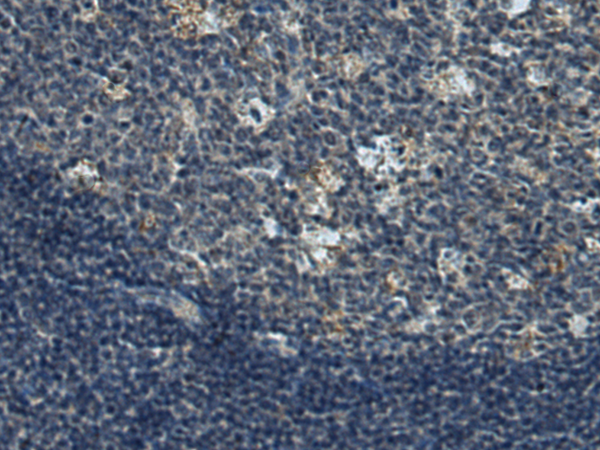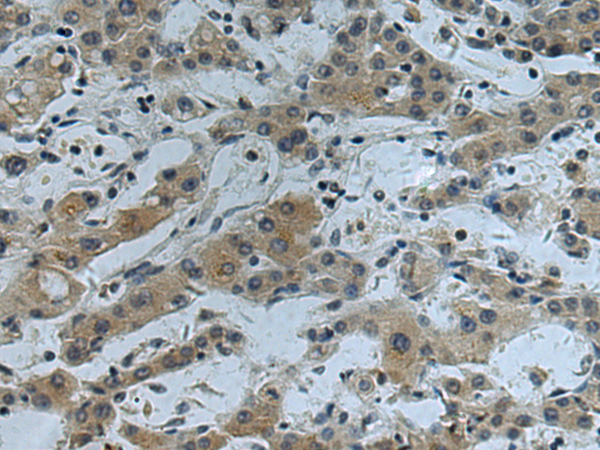


| WB | 1/200-1/1000 | Human,Mouse,Rat |
| IF | 咨询技术 | Human,Mouse,Rat |
| IHC | 1/50-1/200 | Human,Mouse,Rat |
| ICC | 技术咨询 | Human,Mouse,Rat |
| FCM | 咨询技术 | Human,Mouse,Rat |
| Elisa | 1/5000-1/10000 | Human,Mouse,Rat |
| Aliases | GP39; ASRT7; GP-39; YK-40; YKL40; CGP-39; YKL-40; YYL-40; HC-gp39; HCGP-3P; hCGP-39 |
| WB Predicted band size | 43 kDa |
| Host/Isotype | Rabbit IgG |
| Antibody Type | Primary antibody |
| Storage | Store at 4°C short term. Aliquot and store at -20°C long term. Avoid freeze/thaw cycles. |
| Species Reactivity | Human, Rat |
| Immunogen | Fusion protein of human CHI3L1 |
| Formulation | Purified antibody in PBS with 0.05% sodium azide and 50% glycerol. |
+ +
以下是3篇关于CHI3L1抗体的参考文献(信息基于公开研究整合,部分细节可能需核实):
1. **"CHI3L1 (YKL-40) is expressed in human gliomas and regulates the invasion, growth and survival of glioma cells"**
*作者:Pelloski CE et al. (2005)*
摘要:研究证实CHI3L1在胶质瘤中的高表达,通过特异性抗体阻断实验发现其通过激活MAPK/ERK通路促进肿瘤细胞侵袭和存活。
2. **"Anti-CHI3L1 antibody inhibits tumor progression in colorectal cancer via suppressing T cell exhaustion"**
*作者:Chen CC et al. (2021)*
摘要:开发靶向CHI3L1的单克隆抗体,证明其可通过逆转T细胞耗竭抑制结直肠癌小鼠模型的肿瘤生长,提示免疫治疗潜力。
3. **"Chitinase 3-like-1 is a therapeutic target in idiopathic pulmonary fibrosis"**
*作者:Zhou Y et al. (2017)*
摘要:利用CHI3L1中和抗体在肺纤维化模型中显著降低胶原沉积,证实其通过调控IL-13/STAT6通路抑制成纤维细胞活化。
4. **"Serum YKL-40 levels detected by a novel ELISA system predict outcomes in sepsis"**
*作者:Hurtado V et al. (2019)*
摘要:建立基于抗CHI3L1抗体的高灵敏度ELISA检测法,发现血清YKL-40水平与脓毒症患者器官衰竭程度和死亡率正相关。
注:建议通过PubMed/Google Scholar搜索具体标题获取全文。如需实验用抗体推荐,可补充说明研究场景(如种属、应用类型)。
CHI3L1 (Chitinase-3-like protein 1), also known as YKL-40. is a secreted glycoprotein belonging to the chitinase-like protein family. Although it lacks enzymatic activity due to amino acid substitutions in its catalytic domain, CHI3L1 plays critical roles in inflammation, tissue remodeling, and cellular responses to injury. It is implicated in various pathological conditions, including cancer, fibrosis, and inflammatory diseases like asthma and rheumatoid arthritis. Elevated CHI3L1 levels in serum or tissues are associated with disease progression and poor prognosis, making it a potential biomarker.
CHI3L1 antibodies are immunological tools designed to detect, quantify, or inhibit this protein in research and clinical settings. Polyclonal and monoclonal antibodies against CHI3L1 are widely used in techniques such as ELISA, Western blotting, and immunohistochemistry to study its expression, localization, and function. These antibodies help elucidate CHI3L1’s interaction with receptors like IL-13Rα2 or syndecan-1. which mediate its pro-inflammatory and pro-survival signaling.
Therapeutic CHI3L1-neutralizing antibodies are under investigation for targeting CHI3L1-driven pathways in cancers or fibrotic disorders. However, challenges remain in ensuring specificity and minimizing off-target effects. Overall, CHI3L1 antibodies serve as vital reagents for understanding its biological roles and developing diagnostic or therapeutic strategies.
(Word count: 199)
×